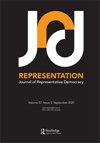选举无效:投票给死亡候选人背后的原因
Q2 Social Sciences
引用次数: 0
摘要
投票给在选举时已经不在人世的候选人可能被视为浪费选票。然而,在某些情况下,这种投票意味着克服法律限制并选择如何代表。这篇文章旨在说明,当公民投票给一位死去的候选人,以废除他们认为不公平的选举法时,这种行为是如何被计算出来的。这是由我们所说的选举程序无效所驱动的,这在政治上相当于陪审团无效。我们使用了2020年9月在罗马尼亚一个约有3000名居民的社区组织的地方选举的证据。一位死去的候选人以64%的选票赢得了选举。我们的结果来自于对投票给该候选人的人的半结构化采访。本节介绍了数据和方法,重点介绍了选择进行分析的案例和受访者的档案。第四节涵盖了文章的核心论点和支持它的证据。结论总结了关键发现,并讨论了对选举和代表权这一更广泛领域的主要影响。本文章由计算机程序翻译,如有差异,请以英文原文为准。
Electoral Nullification: The Reasons Behind Voting for a Dead Candidate
Voting for a candidate that is no longer alive at the time of election may be considered a wasted vote. Nevertheless, there are instances in which such a vote means to overcome the legal limitations and choose how to be represented. This article aims to illustrate how such a behavior can be calculated when citizens vote for a dead candidate to nullify an electoral law that they consider unfair. This is driven by what we call electoral process nulli fi cation, which is the political equivalent of jury nulli fi cation. We use evidence from the local elections organized in September 2020 in a Romanian commune of approximately 3,000 inhabitants. A dead candidate won the elections with 64% of the votes. Our results draw on semi-structured interviews with people who voted for that candidate. section presents the data and method with emphasis on the case selected for analysis and respondents ’ pro fi le. The fourth section covers the central arguments of the article and the evidence brought to support it. The conclusions summarize the key fi ndings and discuss the main implications for the broader fi eld of elections and representation.
求助全文
通过发布文献求助,成功后即可免费获取论文全文。
去求助
来源期刊

Representation
Social Sciences-Sociology and Political Science
CiteScore
3.50
自引率
0.00%
发文量
31
期刊介绍:
This change in scope follows two paths. Firstly, it seeks contributors who are interested in exploring the interface between democratic practice and theory. In particular, this focus seeks contributions that apply theoretical insights to actual examples of current practice. Secondly, while not neglecting the current focus of the journal, we would like to expand its international coverage so that the journal will offer our readers insights in the state of democracy worldwide.
 求助内容:
求助内容: 应助结果提醒方式:
应助结果提醒方式:


